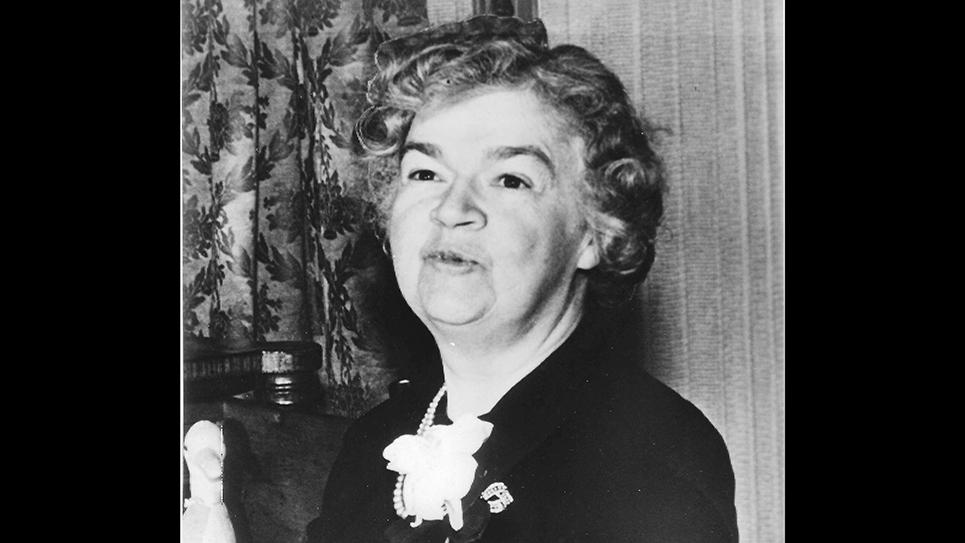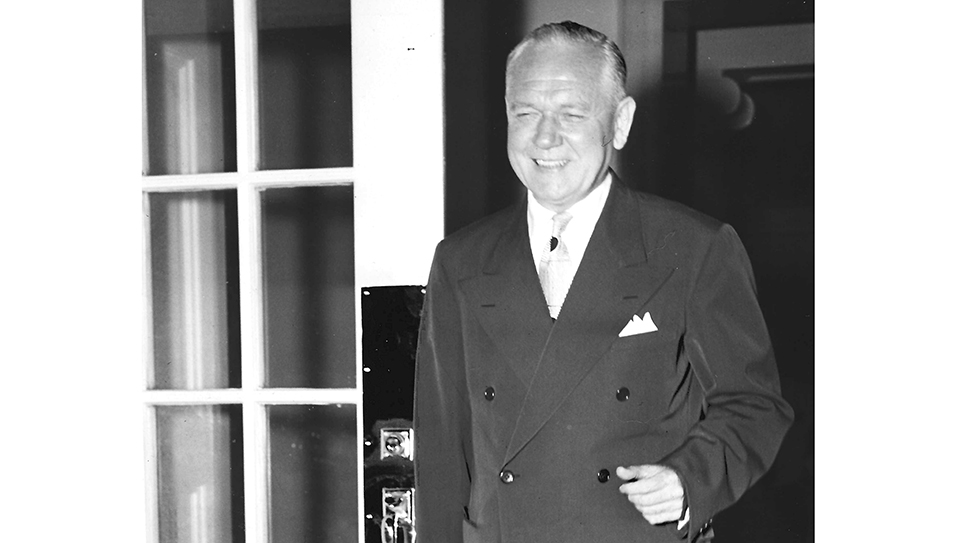The Gentlelady From Massachusetts: Edith Nourse Rogers
Edith Nourse Rogers’ record as the longest-serving female member of Congress was only broken by Marcy Kaptur of Ohio in 2012. During the 35 years she served in the House of Representatives, few legislators of either gender have made such an impact on those areas in which they specialized. New members of Congress throughout the years have frequently been counseled by senior colleagues to pick out an area of interest and work hard at becoming an expert in the field. No congressman of the time had more influence on legislation affecting veterans during her time in office than Edith Nourse Rogers. It was Congresswoman Rogers who wrote part of and sponsored the Serviceman’s Readjustment Act in 1944. That legislation is better known as the “G.I. Bill” today. The bill established financial and educational benefits for veterans who were returning home after the bloodiest war in human history, the Second World War. It was also Congresswoman Edith Nourse Rogers who sponsored two other pieces of legislation that paved the way for women. Rogers was the author of the Women’s Army Auxiliary Corps and the Women’s Army Corps, better known as WAC. When Republicans won control of the House of Representatives, Edith Nourse Rogers became chair of the Veterans Affairs Committee in 1947-1949 and again in 1953-1955. When ailing President Franklin D. Roosevelt signed the G.I. Bill into law, he handed the pen to Congresswoman Edith Nourse Rogers.
Nor was Mrs. Rogers’ sponsorship of the bills to include women in the armed forces universally hailed. There were those in the news media, as well as elective office, who scorned the bills as an attempt to create a “Petticoat Army.” As the leading news magazine of the time noted, “The Women’s Army Auxiliary Corps will provide women for the Army’s humbler jobs – – – switchboard operators, cooks, chauffeurs, laundresses, welfare workers, clerks, Aircraft Warning Service spotter & plotters. They will serve under the War Department, with special names for ranks, but with Army pay, Army uniforms and Army discipline.” Yet, with her patrician manner, Edith Nourse Rogers deigned not to notice the opposition, telling her colleagues serenely she did not know “a human being who is opposed to the bill.” Perhaps the opposition was more about working out the various and somewhat complicated details, such as whether enrollment should be limited, or whether women should be a part of the Army or a separate entity altogether.
It is fitting that the Veterans Hospital in Bedford, Massachusetts, is named for Congresswoman Rogers. A woman of steely determination, Edith Nourse Rogers’ interest in veterans derived from her service with the Red Cross in France during the First World War. Mrs. Rogers had been designated by President Warren G. Harding as his representative to visit wounded Americans in hospitals. Presidents Calvin Coolidge and Herbert Hoover reappointed Edith Nourse Rogers as their representative to American veterans.
An aristocrat, Congresswoman Rogers was no mere dilettante. Small of stature with dark brown eyes, the congresswoman always looked younger than her years. Although she followed her husband into Congress after his sudden death, she quickly established herself as a political force to be reckoned with. First elected in a 1925 special election, Mrs. Rogers faced Eugene Foss, a wealthy former three-term governor in the general election. Foss had been, at various times, a Republican and a Prohibitionist, and ran in the special election as a self-described “Coolidge-Democrat.” Calvin Coolidge was then the president of the United States and a former governor of the Bay State. Edith Nourse Rogers was confident without being obnoxious. After thrashing Eugene Foss in the general election, she said, “I intend to continue my husband’s work. I know I am equal to the detail of the office, for in fact I have been continuing the work ever since my husband died and have managed to keep two secretaries busy. I may not take a very active part in debate, but when the time comes I will be able to stand up and cast my vote when my name is called. I certainly won’t be a ‘pathetic figure’ in Congress.” Edith Nourse Rogers became an extraordinarily effective congresswoman for her district and proved to be unbeatable inside her congressional district. Prospective candidates, Republicans or Democrats, rarely bothered to challenge the congresswoman, acknowledging her productivity on behalf of her district and her formidable personal popularity with her constituents.
While it may be hard to imagine in today’s world, Edith Nourse Rogers’ popularity was not confined to Republicans in the House of Representatives. When Democrats in Massachusetts publicly began discussing carving up her district in the redistricting process, it was John McCormack, the powerful majority leader of the U.S. House of Representatives, who insisted she be left alone. When Mrs. Rogers was celebrating her thirtieth year in office, member after member of the House rose to pay tribute to her; the first was Joe Martin, her colleague from Massachusetts and the House Republican Leader. Then John McCormack got to his feet to laud the gentlelady from the Bay State. After all the members had spoken who wished to, Edith Nourse Rogers spoke with both grace and wit.
“With all its ups and downs,” Mrs. Rogers said, “I have enjoyed every minute of it. I have tried awfully hard to be worthy of the trust placed in me.” After a momentary pause, the congresswoman added, “And the first 30 years are the hardest.”
When famed aviator Colonel Charles Lindberg lobbied Congress on behalf of airplanes, two of the first passengers to fly with him were Congresswomen Edith Rogers and Katherine Langley of Kentucky. Also amongst those watching those who were brave enough to accompany Colonel Lindberg in a flight was a weathered old gentleman with a bristling white mustache who was so heavily bundled up in an overcoat no one recognized him right off. When the old fellow “smiling like a boy, stepping quickly with excitement” finally removed his hat to shake off the “mud and gravel” stirred up by the propellers of Lindberg’s plane, observers spotted 87-year-old Associate Justice of the U.S. Supreme Court Oliver Wendell Holmes.
Both of Edith Rogers’ parents were members of prominent New England families who could afford to have their daughter privately tutored. At age 14, Edith Nourse attended a private boarding school for girls in Lowell, Massachusetts. After graduation, she went to Madame Julien’s School, a “finishing” school in France. Following the example set by her mother, who regularly volunteered her time for worthy causes, Edith became a volunteer for her church as well as for charities. Edith Nourse married John Jacob Rogers in 1907 after he had just graduated from Harvard’s Law School. Although a practicing attorney, John Jacob Rogers was described by TIME magazine as a “textile tycoon.” The couple settled in a sprawling Victorian house in Lowell and Rogers began ascending the political ladder, having become active in city politics and as a school commissioner. In 1912, John Jacob Rogers won the Republican nomination for Congress in the Fifth Congressional District of Massachusetts.
While still serving in the House of Representatives, John J. Rogers went to Great Britain and later France. Eventually, Rogers volunteered as a private where he trained with an artillery battalion. Edith Rogers accompanied her husband overseas, volunteering first with the Young Men’s Christian Association and then as a “Gray Lady” for the American Red Cross. It was there Mrs. Rogers noticed the conditions under which women worked to support the military. Aside from those who worked as nurses, the women were categorized as civilians and received no benefits of any kind. It was a stark contrast to those women from Britain who were part of the military and who received benefits.
In 1924, Edith Rogers served as a presidential elector for Calvin Coolidge. The following year, John J. Rogers died unexpectedly following an operation. At the time of her election to the House of Representatives, Edith Nourse Rogers was the first woman to be elected to Congress from New England.
Politically, although 77 years old, Edith Nourse Rogers was considered the strongest potential challenger to then-U.S. Senator John F. Kennedy. As is the case of most long-term congressmen, Edith Rogers was adept at promoting and protecting the industries and businesses of her district. The congresswoman suggested to Secretary of War Patrick J. Hurley that the uniforms of the Army’s enlisted men should be blue. In true patrician fashion, Mrs. Rogers explained, “Wartime khaki uniforms are drab and tiresome to the eye. . .” Then the congresswoman got to the point. Blue uniforms would mean the necessity of providing enlisted men with black shoes. Mrs. Rogers’ district was one of the leading centers of shoe manufacturing in the country.
During the 1928 presidential campaign, Edith Nourse Rogers became the first woman to speak at Boston’s Faneuil Hall on Independence Day, as TIME magazine put it, “since the Cradle of Liberty first rocked.” The congresswoman praised both GOP presidential nominee Herbert Hoover as well as the Democratic nominee, Governor Al Smith of New York.
Ironically, Edith Nourse Rogers was the author of a resolution to retire House members at age 70 ½. She would serve well beyond that age herself. As always, interested in every aspect of the lives of veterans, Congresswoman Edith Nourse Rogers attended a luncheon with perhaps the most outspoken critic of artificial limbs in the country, Colonel Robert S. Allen. At one time, Allen had been the journalistic partner of nationally known muckraker Drew Pearson. Together, the duo wrote the Washington-Merry-Go-Round column, which was syndicated in newspapers across the country. Allen had quit to fight in the Second World War and lost an arm. Aside from Congresswoman Rogers, in attendance was Major General Paul R. Hawley, head of the Veterans’ Administration. General Hawley stunned Colonel Allen by naming him as the chairman of a committee to approve new prostheses for amputees. Hawley told the colonel to pick the members of his committee himself.
Congresswoman Edith Rogers was one of those in the House of Representatives who loathed the trimming of the budget passed in 1932 when Herbert Hoover sat in the White House. Times were hard due to the Great Depression and as an effort to pare the federal budget, an “economy bill” was passed, which had the effect of firing a spouse if both worked for the government. Opponents raged it amounted to nothing less than a penalty or tax on being married. The burden fell disproportionally on wives; 80% of those employees let go were women. That law was still in effect in 1937 when Democrat John J. Cochran of. Missouri sought to tighten the measure with an amendment to a bill proposed by Congressman Emanuel Celler of New York. Celler was attempting to repeal the unfair law, which Cochran sought to cripple with his amendment to strengthen the legislation. Some speculated the law encouraged some couples to live together, unwed. The Cochran amendment failed and the House repealed the law 203-129. TIME magazine reported, “Broad smiles spread on the battle-scarred visages of Edith Nourse Rogers, Mary T. Norton, Caroline O’Day” with the defeat of the Cochran amendment and the repeal of the law penalizing married couples. The news magazine, tongue in cheek, stated, “Faraway looks came into the big, beautiful eyes of Government stenographers as they began to dream again of legal love.”
Edith Nourse Rogers was a candidate for reelection in 1960 when she became ill in September. Taken to the hospital, the congresswoman developed pneumonia. Although 79 years old, Congresswoman Rogers was thought to be improving when she died of a sudden heart attack. The congresswoman’s physician, Dr. Greene FitzHugh, said Rogers’ death was “very sudden.” Edith Nourse Rogers’ passing came as a shock to the people of her district and fellow members of Congress, especially as she had insisted her illness not be publicly disclosed.
A pioneer of the women’s movement, Edith Rogers should be remembered today.
© 2024 Ray Hill







